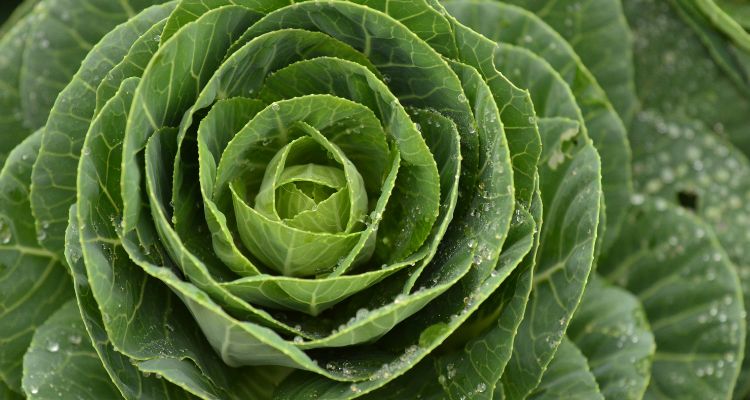Rabbit food can be tricky to navigate, and there are many opinions on what is safe and healthy for them. Many rabbit owners wonder, can rabbits eat cabbage, which the short answer is yes.
But with different varieties of cabbage, and understanding whether to feed the cabbage leaves, stalks or core to your rabbit comes more explanation.
In this article, we will dive deep into rabbit nutrition and explore whether or not cabbage is a safe and nutritious addition to your bunny’s diet.
Can Rabbits Eat Cabbage?
Rabbits can eat cabbage, including white cabbage, savoy cabbage and spring greens, as part of a healthy and balanced diet. However, a few things to remember when feeding your rabbit cabbage.
- Give them the leaves and stalks – you should avoid feeding your rabbit the core – it could cause digestive issues.
- Avoid feeding your rabbit cooked cabbage, as they rely on raw foods for proper nutrient intake.
Health Benefits of Cabbage for Your Rabbit
Cabbage is a nutritious vegetable containing vitamins B, C, and K and essential minerals like potassium, calcium, and phosphorus. It also has antioxidants that can help prevent cell damage in rabbits.
Cabbage benefits are numerous, but precautions must be taken when feeding your rabbit. Fresh cabbage should only supplement your rabbit’s already well-balanced diet and makeup 10-15% of it. Cooking cabbage is not recommended for rabbits as they rely on raw foods to get their nutrients.
It would be best not to feed immature or sick rabbits cabbage.
Types of Cabbage
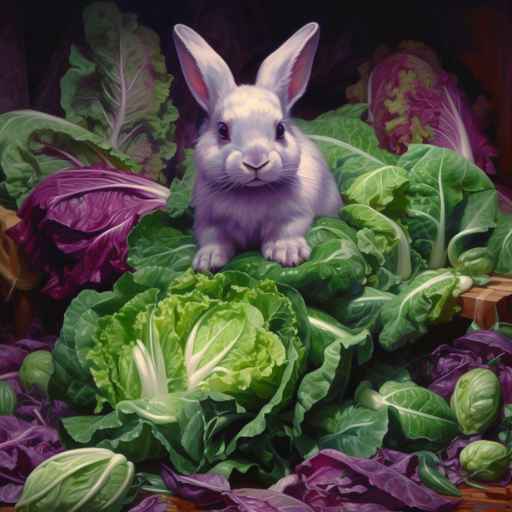
Most rabbits love leafy greens such as cabbage. There are many different types of cabbage available. Your rabbit can benefit from all types of cabbage, but certain varieties, such as savoy cabbage, are richer in vitamins and minerals that can be more beneficial for your pet.
- Green cabbage is the most common type and an excellent vitamin and mineral source.
- Red cabbage (purple cabbage) contains more antioxidants than green cabbage.
- Savoy cabbage has a milder taste and softer leaves.
- Chinese cabbage (also known as napa cabbage) is also safe for rabbits to eat, as well as Brussels sprouts which are tiny cabbages.
- White cabbage is a type of cabbage that is pale green and has tightly packed leaves. While it is safe for rabbits to eat, it may not be the best choice for their nutrition and digestion compared to dark green leafy vegetables.
Green Cabbage
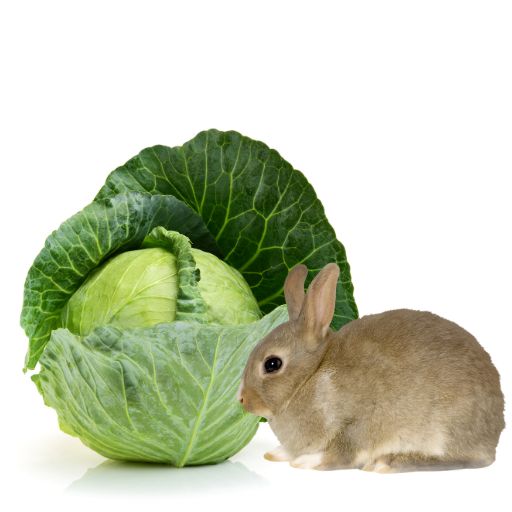
Green cabbage is packed with vitamins and minerals that are beneficial for rabbits. It contains essential nutrients such as vitamin C, potassium, calcium, phosphorus, and fiber. Additionally, green cabbage has antioxidant properties that may help prevent cell damage in your furry friend.
To prepare green cabbage for your rabbit, wash the leaves thoroughly and cut them into small pieces to avoid choking hazards. Remember to slowly introduce a new food into your rabbit’s diet to avoid gastrointestinal issues or other adverse reactions.
As with all vegetables given to your rabbit, ensure not to overfeed on the cabbage as it should only supplement their daily intake of high-quality hay and commercial pellets. Overall, when prepared correctly and fed in moderation, green cabbage can be a great source of nutrition for your beloved bunny friend.
Red or Purple Cabbage
If you want to switch up your bunny’s veggie game, red or purple cabbage could be a colorful addition to their diet! Not only does it add variety to their meals, but it also provides a range of health benefits.
Red and purple cabbage contains high levels of antioxidants like anthocyanins, which can help prevent rabbit cell damage. They also contain vitamins B, C, and K and minerals like calcium and phosphorus essential for a rabbit’s immune system.
When preparing red or purple cabbage for your pet rabbit, make sure to wash it thoroughly to remove any pesticides or chemicals that could be harmful. Cut the cabbage into bite-sized pieces before serving it to your bunny. Mix it with vegetables like broccoli or kale for added nutrition and flavor.
Be sure to give your rabbit only a little cabbage at a time, though – it should only make up about 10-15% of their diet.
Savoy Cabbage
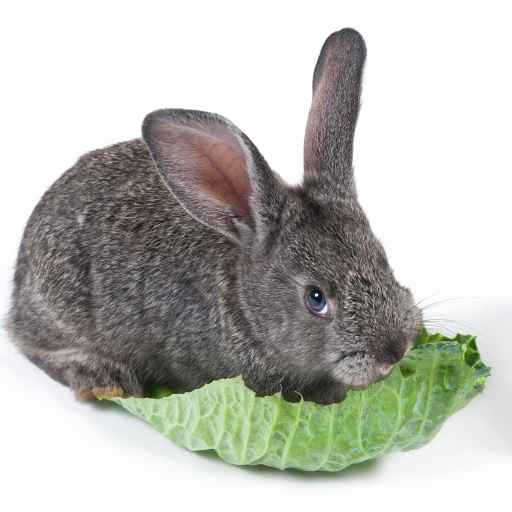
Savoy has crinkly leaves and a milder flavor than regular green cabbage. It also provides vital nutrients essential for maintaining rabbit health, such as vitamins B, C, and K, calcium, potassium, and phosphorus.
However, like any new food introduced into a rabbit’s diet, taking precautions when feeding them savoy cabbage is essential.
As with other types of cabbage, limit the serving size to a maximum of 1/3 of their daily intake of fruits and vegetables.
Chinese Cabbage (Napa)
Adding Chinese cabbage to your rabbit’s diet can provide a nutritious and flavorful option for their daily vegetable intake.
This variety of cabbage, also known as Chinese celery cabbage or wong bok, is commonly used in Asian cuisines and can be found in many grocery stores.
Napa cabbage has several health benefits for rabbits, such as being high in vitamin C, fiber, and antioxidants. Cabbage recipes for rabbits can include adding bite-sized pieces of raw Chinese Napa cabbage to their hay or mixing it with other fresh vegetables like leafy greens or bell peppers. Think of making a salad for your pet rabbit!
Brussels Sprouts
Did you know that Brussels sprouts are mini cabbages? They belong to the same family of Brassicaceae vegetables, including broccoli, cauliflower, kale, and collard greens—all beautiful choices for your bunny.
Like other leafy greens, they contain high levels of vitamin C, fiber, and antioxidants which can help boost the immune system and improve digestion. Like with introducing cabbage to rabbits, do so in moderation and chop them up for your bunny.
Is Cabbage Good For Rabbits?
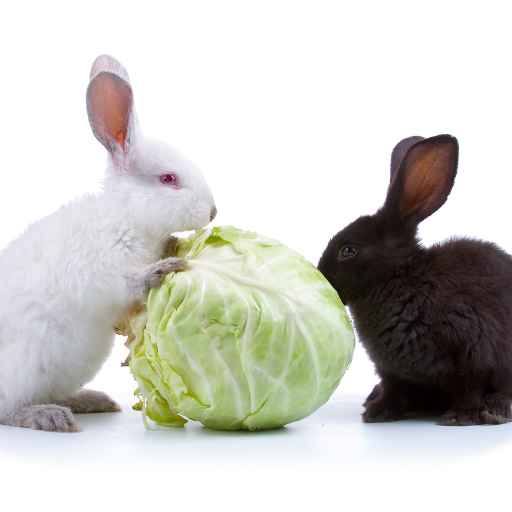
Cabbage is super healthy for rabbits and contains many vitamins and minerals such as vitamin B6, calcium, potassium, vitamin K, and smaller quantities of magnesium, fiber, phosphorus, zinc, and vitamin E.
However, it’s important to remember that cabbage should be fed to rabbits in moderation and as part of a balanced diet. While most rabbits will eat cabbage when offered, excessive consumption can lead to potential risks such as diarrhea.
It is safe for rabbits to eat cabbage as an occasional treat, but owners must monitor their rabbits for signs of gastrointestinal distress. It is necessary to incorporate alternative vegetable options into your rabbit’s diet.
Cabbage Leaves
Cabbage leaves are a great addition to a rabbit’s diet as they’re low in sugar, making them an excellent source of nutrients for your pet.
Here are five things to keep in mind when incorporating cabbage leaves into your rabbit’s diet:
- Always wash the cabbage leaves thoroughly before giving them to your rabbit.
- Cut the cabbage leaves into small pieces that are easy for your rabbit to eat.
- Avoid feeding wilted cabbage leaves as they may contain harmful bacteria.
- Watch out for any signs of cabbage allergies such as lethargy, diarrhea, or anorexia.
- Use cabbage substitutes like other leafy green vegetables, kale or spinach if necessary.
Cabbage Core
It is not recommended that rabbits eat the core or heart of the cabbage. The heart is tough and may be difficult for your rabbit to digest, which can cause gastrointestinal problems such as blockages or impactions, leading to serious health issues. Stick with feeding your bunny the softer leaves rather than the core.
Cabbage Stalks
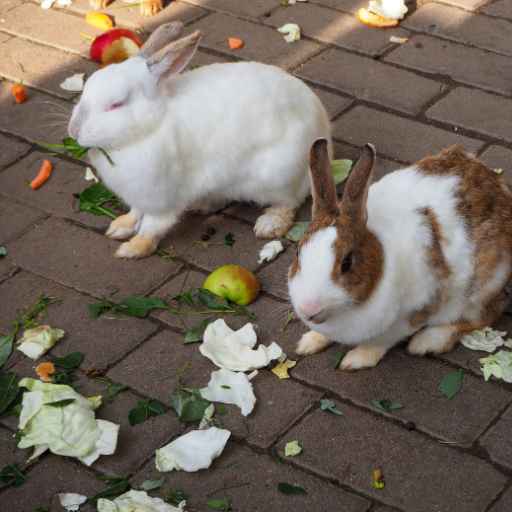
Cabbage stalks (the thicker section that the leaves branch off) are safe for rabbits to eat and can make a great addition to their diet in moderation.
When serving cabbage stalks to your rabbit, be sure to wash them thoroughly to remove any pesticides or chemicals that could be harmful. Cut the stalks into bite-sized pieces and offer them alongside other vegetables as part of a balanced diet.
Remember that fresh vegetables should only supplement your rabbit’s well-balanced diet and make up 10-15% of their daily food intake.
Cooked Cabbage
While rabbits should only consume raw foods for essential nutrients, cooked cabbage can still be a delicious and healthy treat when appropriately prepared.
Here are some pros and cons of feeding your rabbit cooked cabbage, along with some cooking methods to retain the most nutrients.
– Pros: Cooking cabbage can break down tough fibers that make it difficult to digest. This can make it easier for rabbits with sensitive stomachs to eat and help prevent digestive issues such as bloating or gas.
– Cons: Boiling cabbage can cause nutrient loss, as essential vitamins and minerals leach into the water rather than the food itself.
Cooking Methods:
Steaming or microwaving cabbage is one of the best ways to retain its essential nutrients. These methods allow the vegetable to cook quickly without losing many vitamins or minerals.
Nutrient Retention:
Avoid overcooking the cabbage by keeping it crisp-tender instead of soft or mushy to maximize nutrient retention.
Alternative Greens:
If you’re looking for an alternative green that doesn’t require cooking but still contains similar health benefits as cabbage, consider adding kale or spinach to your rabbit’s diet.
Tips for Feeding Cabbage to Your Rabbit
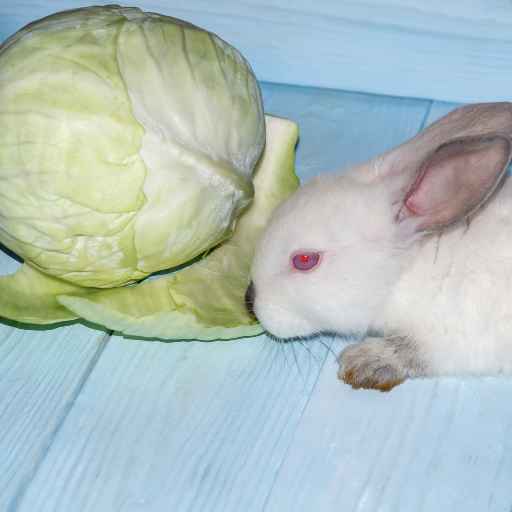
When preparing cabbage for your rabbit, wash them thoroughly beforehand to remove any pesticides or chemicals that could harm them. Cut the pieces into bite-sized portions before serving- this will help with digestion and prevent choking hazards.
Lastly, remember that while incorporating some fresh vegetables in your bunny’s diet is beneficial in moderation- too many veggies can lead to digestive problems, thus causing unnecessary stress on their gut health overall.
A rabbit’s primary source of food should come from high-quality hay. Always consult a veterinarian before changing or adding anything new to your rabbit’s diet, especially if they have any pre-existing digestive issues or illnesses.
How Much Cabbage Can a Rabbit Eat?
Including cabbage in a rabbit’s diet can provide essential nutrients, but it’s important to be mindful of the amount given, as too much can upset the stomach. The serving size of cabbage for a rabbit should be up to 1/3 of its total fruits and vegetables for the day. It’s also essential to introduce cabbage slowly and with caution, especially if your rabbit has yet to have it before.
While there are potential risks associated with feeding cabbage, such as adverse reactions like lethargy or diarrhea when fed in moderation, cabbage can benefit rabbits.
To help you better understand how much cabbage is appropriate for your rabbit’s diet, here is a table outlining serving sizes based on your rabbit’s weight:
| Rabbit Weight | Serving Size |
|---|---|
| Less than 2 pounds | No more than 1/8 cup per day |
| 2-4 pounds | No more than 1/4 cup per day |
| More than 4 pounds | Up to 1/2 cup per day |
Remember that fresh vegetables should only supplement your rabbit’s already well-balanced diet and make up about 10-15% of its diet. Alternative vegetables that could be fed instead of or in addition to cabbage include kale, spinach, parsley, and cilantro.
It’s crucial to watch out for any potential allergies or adverse reactions your rabbit may have to cabbage. If you notice any lethargy, diarrhea or loose stools, anorexia, or excessive itching/scratching after feeding them cabbage (including the core), discontinue use immediately and consult a veterinarian.
Can Baby Rabbits Eat Cabbage?
It’s important to note that baby rabbits have much more sensitive gastrointestinal systems than adult rabbits. Therefore, it’s best to wait until they reach 12 weeks of age before introducing solids into their feeding schedule.
The digestive health of young rabbits is still developing, and sudden changes in their diet can lead to gastrointestinal upset. Additionally, baby rabbits’ nutrient requirements differ from those of adult rabbits, so it’s crucial to ensure they’re getting the right balance of nutrients from their food.
As with any new food item, it’s essential to watch for common allergies or adverse reactions such as lethargy or diarrhea when introducing cabbage or other vegetables into a baby rabbit’s diet.
Can Dwarf Rabbits Eat Cabbage?
Dwarf bunnies can munch on this leafy green veggie, but following some guidelines is essential when giving them cabbage. Dwarf rabbits and digestion are delicate, so it’s crucial to introduce new foods gradually. Start by offering small pieces of cabbage and monitoring your bunny for any adverse reactions.
Cabbage contains indigestible sugars that can cause gas or bloating in rabbits, so it’s best to limit the amount you give them. While cabbage is a nutritious addition to your rabbit’s diet, there are potential health risks of cabbage for rabbits if given in excess amounts.
Incorporate cabbage into a rabbit’s diet as part of their daily vegetables, but ensure they get a variety of other veggies too. Alternative vegetables for rabbits include arugula, spinach, collard greens, parsley, and dill.
Remember that fresh water should always be available for your dwarf rabbit, along with high-quality hay and good-quality pellets. Consult with a veterinarian before making any changes to your dwarf rabbit’s diet or if you have any concerns about their health.
Can Lop-Eared Rabbits Eat Cabbage?
If you want your beloved lop-eared companion to thrive and feel their best, you can incorporate cabbage into their diet as a nutritious addition. However, following guidelines when introducing new foods to your rabbit’s diet is essential.
Cabbage should only be given in moderation, as too much can lead to digestive issues such as gas and bloating. Some rabbits may have allergies or sensitivities to cabbage, so introduce this new food slowly and monitor your rabbit for adverse reactions.
Ensure the cabbage is thoroughly washed and free of harmful pesticides before feeding it to your bunny. Following these guidelines, you can safely incorporate cabbage into your lop-eared rabbit’s diet as an occasional treat or supplement.
Can Lionhead Rabbits Eat Cabbage
Incorporating cabbage into your lionhead rabbit’s diet can be a nutritious addition. Still, following guidelines and introducing this new food slowly is essential to avoid any potential digestive issues or adverse reactions. As with any new food, starting with small amounts and gradually increasing the serving size over time is essential.
While cabbage is generally safe for rabbits, it does contain compounds that can lead to gas and bloating if consumed in large quantities. It’s also crucial to note that not all vegetables are safe for rabbits, and some human foods can be toxic.
When feeding your lionhead rabbit vegetables, stick with leafy greens like kale or spinach and avoid root vegetables like carrots or potatoes. Additionally, any human food given as a treat should be limited in quantity and only offered occasionally.
Always consult a veterinarian before changing your lionhead rabbit’s diet or adding new foods to their regimen.
What other vegetables can rabbits eat besides cabbage?
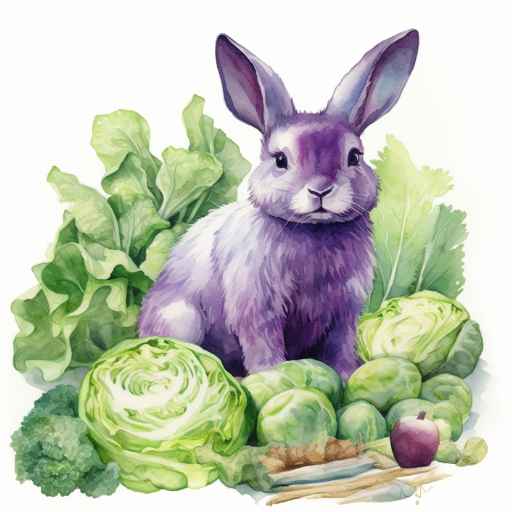
Some great fruit choices include apples and pears, which are low in sugar but high in fiber.
Leafy green vegetables such as bok choy, kale and spinach are packed with vitamins and minerals that can boost your rabbit’s immune system.
Root vegetables like carrots and sweet potatoes are also great options as they provide necessary nutrients while satisfying the natural urge to chew.
Berries such as strawberries and blueberries are another great choice, packed with antioxidants to help prevent cell damage.
And if you’re looking for some variety, broccoli, and bell peppers are other veggies that can safely be added to your rabbit’s diet in moderation.
Conclusion
The next time you are preparing cabbage for yourself, try giving a small handful of cabbage to your rabbit. Remember to feed it to your rabbit slowly and introduce cabbage in moderation. As you know, rabbits have a sensitive digestive system and any changes should be carefully monitored.
By providing a well-balanced diet that includes hay, commercial pellets, and limited servings of fresh fruits and mixed leafy green vegetables like cabbage, you can help ensure your bunny stays healthy and happy.

